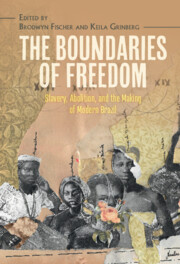Contents
Introduction: Slavery and Freedom in Nineteenth-Century Brazil
Part ILaw, Precarity, and Affective Economies during Brazil’s Slave Empire
1The Crime of Illegal Enslavement and the Precariousness of Freedom in Nineteenth-Century Brazil
2“Hellish Nurseries”: Slave Smuggling, Child Trafficking, and Local Complicity in Nineteenth-Century Pernambuco
3Agrarian Empires, Plantation Communities, and Slave Families in a Nineteenth-Century Brazilian Coffee Zone
4Motherhood Silenced: Enslaved Wet Nurses in Nineteenth-Century Brazil
5The Abolition of Slavery and International Relations on the Southern Border of the Brazilian Empire, 1840–1865
Part IIIRacial Silence and Black Intellectual Subjectivities
9Breaking the Silence: Racial Subjectivities, Abolitionism, and Public Life in Mid-1870s Recife
10The Life and Times of a Free Black Man in Brazil’s Era of Abolition: Teodoro Sampaio, 1855–1937
11Political Dissonance in the Name of Freedom: Brazil’s Black Organizations in the Age of Abolition
12“The East River Reminds Me of the Paraná”: Racism, Subjectivity, and Transnational Political Action in the Life of André Rebouças
Part IVAfterlives of Slavery, Afterwards of Abolition
13The Past Was Black: Modesto Brocos, The Redemption of Ham, and Brazilian Slavery
14From Crias da Casa to Filhos de Criação: Raising Illegitimate Children in the “Big House” in Post-Abolition Brazil
15Slave Songs and Racism in the Post-Abolition Americas: Eduardo das Neves and Bert Williams in Comparative Perspective

